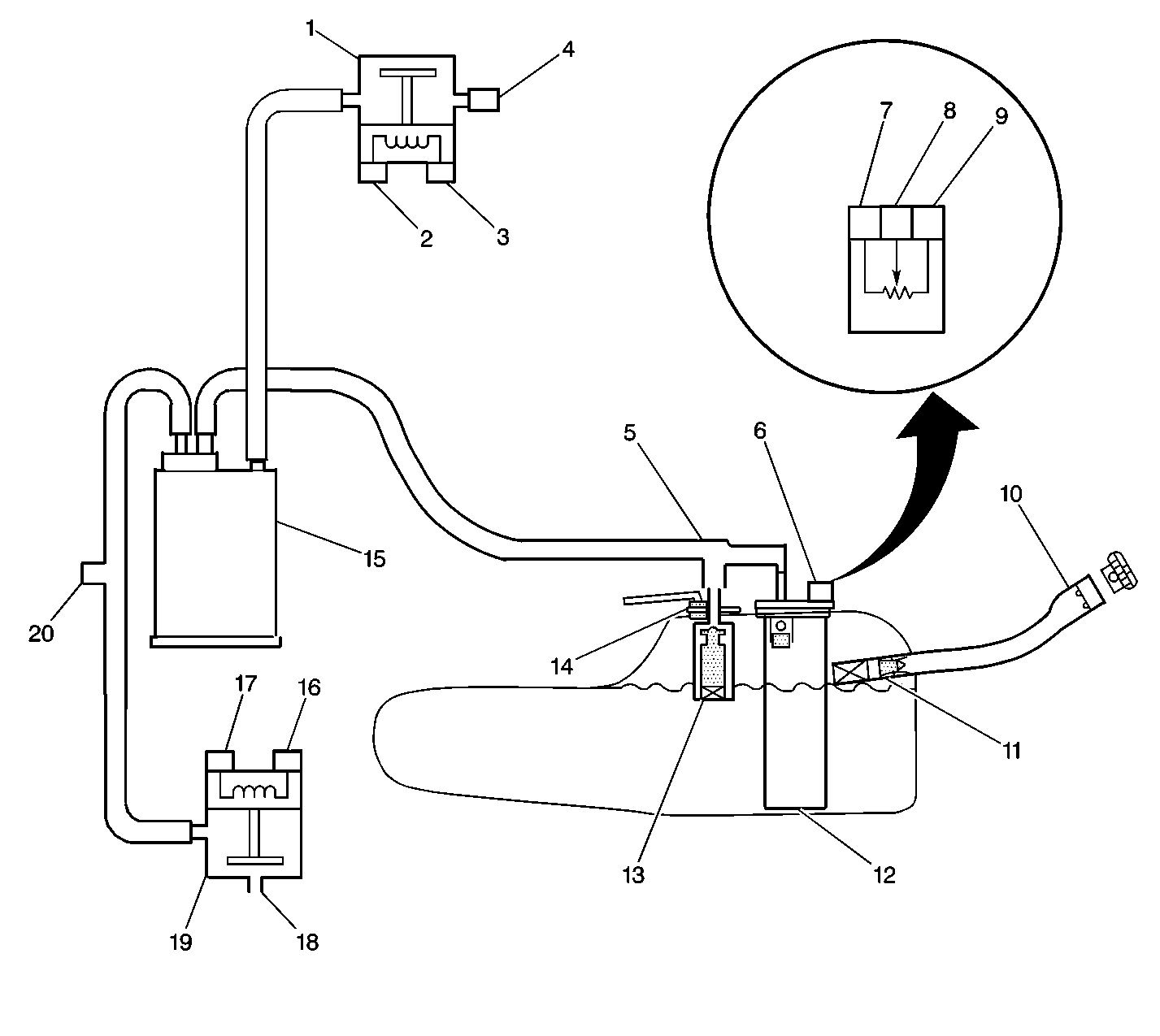Refer to Emission Hose Routing Diagram,
EVAP Control System Overview

System Description
This DTC tests the evaporative emission (EVAP) system for a small leak. The control module monitors the fuel tank pressure (FTP) sensor signal to determine the vacuum decay rate. At an appropriate time, the control module turns the EVAP canister purge valve ON and the EVAP vent valve ON. This allows the engine to draw a vacuum on the EVAP system. At a calibrated time, or vacuum level, the control module turns the EVAP canister purge valve OFF, sealing the system, and monitors the FTP sensor input in order to determine the EVAP system vacuum decay. If the control module detects a leak larger than a calibrated amount, this DTC sets.
The following table illustrates the relationship between the ON and OFF states, and the Open or Closed states of the EVAP canister purge and vent valves.
Control Module Command | EVAP Canister Purge Valve | EVAP Canister Vent Valve |
|---|---|---|
ON | Open | Closed |
OFF | Closed | Open |
Conditions for Running the DTC
| • | DTCs P0107, P0108, P0112, P0113, P0116, P0117, P0118, P0121, P0122, P0123, P0125, P0440, P0443, P0449, P0452, P0453, P1106, P1107, P1112, P1114, P1115, P1121, or P1122 are not set. |
| • | The ignition voltage is between 10-18 volts. |
| • | The barometric pressure (BARO) is more than 75 kPa. |
| • | The fuel level is between 15-80 percent. |
| • | The engine coolant temperature (ECT) is between 4-30°C (39-86°F). |
| • | The intake air temperature (IAT) is between 4-30°C (39-86°F). |
| • | The start up ECT and IAT are within 9°C (16°F). |
| • | The vehicle speed sensor (VSS) is less than 121 km/h (75 mph). |
Conditions for Setting the DTC
The EVAP system can achieve vacuum, but a vacuum decay is detected during the diagnostic test.
Action Taken When the DTC Sets
| • | The control module illuminates the malfunction indicator lamp (MIL) when the diagnostic runs and fails. |
| • | The control module records the operating conditions at the time the diagnostic fails. The control module stores this information in the Freeze Frame/Failure Records. |
Conditions for Clearing the MIL/DTC
| • | The control module turns OFF the malfunction indicator lamp (MIL) after 3 consecutive ignition cycles that the diagnostic runs and does not fail. |
| • | A current DTC, Last Test Failed, clears when the diagnostic runs and passes. |
| • | A history DTC clears after 40 consecutive warm-up cycles, if no failures are reported by this or any other emission related diagnostic. |
| • | Clear the MIL and the DTC with a scan tool. |
Diagnostic Aids
The EVAP system tests run when the engine is first started and meets the Conditions for Running the DTC. To aid in locating intermittent leaks, use the J 41413 EVAP Pressure and Purge Station to pressurize the EVAP system. Move all EVAP components while testing with the J 41416 Ultrasonic Leak Detector.
Test Description
The numbers below refer to the step numbers on the diagnostic table.
-
This step verifies that a leak is present.
-
This step verifies that repairs are complete and that there are no other leaks in the system.
Step | Action | Values | Yes | No | ||||||||||||||||||||
|---|---|---|---|---|---|---|---|---|---|---|---|---|---|---|---|---|---|---|---|---|---|---|---|---|
1 | Did you perform the Diagnostic System Check-Engine Controls? | -- | Go to Step 2 | |||||||||||||||||||||
2 | Does the scan tool indicate DTCs P0443, P0449, P0452, or P0453 are also set? | -- | Go to Step 3 | |||||||||||||||||||||
3 |
Did you find and correct the condition? | -- | Go to Step 5 | Go to Step 4 | ||||||||||||||||||||
|
Important: Always zero the EVAP pressure and vacuum (in H2O) gages on the EVAP Pressure and Purge Station before proceeding with diagnosis.
Important: The fuel tank may need to be partially lowered to inspect components located in the upper portion of the tank.
Did you find and correct the condition? | 15 in H2O | Go to Step 5 | Go to Diagnostic Aids | |||||||||||||||||||||
Does the EVAP system pressure remain constant? | 5 in H2O | Go to Step 6 | Go to Step 4 | |||||||||||||||||||||
6 | With a scan tool, observe the stored information, Capture Info. Does the scan tool display any DTCs that you have not diagnosed? | -- | System OK |
